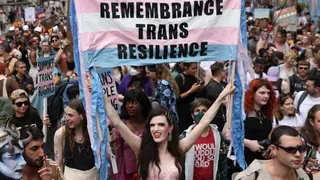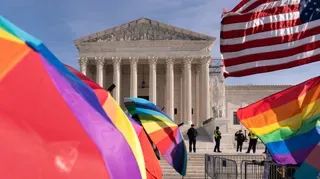July 5, 2011
Lawsuit filed to nip anti-circumcision initiative
Kevin Mark Kline READ TIME: 4 MIN.
Opponents of the anti-circumcision ballot initiative might cut it short before San Francisco voters get the chance to decide on the controversial measure.
In an unusual collation, Jews, Muslims, and medical experts joined together June 22 and filed a lawsuit to block the initiative that seeks to ban and criminalize circumcision from being on the November 8 ballot.
A hearing is scheduled for 9:30 a.m. on July 15. It is expected that the court will make a decision within two weeks, said Michael Jacobs, a partner at Morrison and Foerster who took the case pro bono.
The initiative, which qualified for the November ballot last month, seeks to criminalize anyone performing circumcision - the practice of removal of the foreskin that covers the tip of the penis - on boys under the age of 18 within San Francisco. Violations would result in a misdemeanor with a fine of up to $1,000 or imprisonment in county jail for up to one year, or both. Medical exceptions are permitted in the initiative, but there isn't a religious exemption.
Circumcision is most often practiced in Jewish and Muslim religions. It is also seen as a preventative measure for HIV, among other health issues.
Opponents state the initiative is invalid due to state law that prohibits local municipalities and counties from restricting medical professionals from performing medical procedures and also goes against the U.S. Constitution's free exercise clause.
In the late morning sun on the first hot San Francisco summer day, the plaintiffs gathered with Jacobs on the steps of City Hall and announced their joint opposition to the initiative. The plaintiffs include the Jewish Community Relations Council and the Anti-Defamation League along with five Jewish and Muslim families and two medical professionals.
"This proposed initiative to the Jewish or the Muslim communit[ies] says your religious practice, even if they are entirely consistent with the medical evidence, are threatened," said Jacobs. "We just don't think that it's appropriate for either community or for parents in general or for doctors to have to wonder what is going to happen in November and have to worry about this."
The families said they feel threatened and would be injured by not being allowed to practice their faith if voters pass the initiative. In addition to the lack of a religious exception, many in San Francisco's Jewish community became agitated by anti-Semitic propaganda created and released by initiative author Matthew Hess earlier this month.
Openly gay District 8 Supervisor Scott Wiener, who is Jewish, pledged his support to stand with the opponents to defeat the initiative if it appears on the November ballot.
City Attorney Dennis Herrera is "screened off" from intervening in the matter to avoid the "appearance of conflicting loyalties" due to his bid for mayor, according to Herrera spokesman Matt Dorsey.
'Undemocratic'
Lloyd Schofield, who is leading the anti-circumcision initiative campaign and was named a real party of interest in the lawsuit, called the lawsuit "undemocratic," especially since San Franciscan voters "gave an overwhelming response to our initiative," he said.
Hess and Schofield consulted with attorneys over the weekend and reviewed the proposed injunction, they told the Bay Area Reporter.
Schofield pointed out the medical exemption included in the initiative did not disallow "medical intervention."
Hess added that circumcision can "lead to loss of sensitivity and complications up to and including death." He believes it's "quite 'reasonable' to require that an adult give his permission first."
"Parents and religious groups are claiming that it's their right to genitally cut their children when it is not their right ... parents are a guardian and can only act in that child's best interest," Schofield added.
Marc Salomon, who was on his way to the Farmers Market in the Civic Center when he happened upon the press conference, agreed.
"As a gay man who's been around a lot of penis, I really think that foreskins are there for a reason and that nature should trump nurture in this case," said Salomon, a 48-year-old software engineer. The issue wasn't on the top of his political list, said Salomon, who identified as a non-observant Jewish man, but he strongly stated that "it's not right for parents to take irreversible steps against their child to meet their religious needs or any other need."
Hess took offense to claims in the lawsuit that the initiative "targets" unlicensed Jewish Mohels and violates the U.S. Constitution's free exercise clause.
"The measure targets all forced circumcisions of males and does not single out Mohels or any one religion," he wrote in an email.
'Fruitless' effort
Opponents are confident that they will prevail in their pre-election challenge to the initiative.
Jacobs claimed that the initiative is "fruitless" and an unnecessary use of taxpayer's dollars and creates "emotional community divisions concerning the initiative," pointing to the anti-Semitic overtones.
"If we prevail - as we expect - then this won't go on the ballot and the people of San Francisco won't get involved in a debate about circumcision that's also fruitless," said Jacobs.
"The state has already decided ... we have a very strong argument under the state statute that prohibits localities from restricting medical procedures by medical professionals," he added, pointing to Section 460(b) of California's Business and Professions Code.
Wiener, who was at a Metropolitan Transportation Commission meeting in Oakland, applauded the legal challenge and pledged to stand with the opponents and to defeat the initiative if it appears on the November ballot.
"We have an unfortunate history in California of asking the voters to vote on discriminatory and illegal initiatives. This is another in that line," Adam Taylor, a legislative aide to Wiener, read from a prepared statement by the supervisor on the steps of City Hall. "This unwise and unconstitutional initiative should not be on the ballot, and I applaud you for challenging its constitutionality."
Hess and Schofield dismissed the opponents' interpretation of the business code and the Constitution. They stood their ground with their own interpretation of the state code, the Constitution, and the U.S. Supreme Court's ruling in Prince v. Massachusetts (1944), which held that the government has broad authority to regulate the actions and treatment of children.
"If standing up for the rights for people who are under 18 to have intact genitals is creating community division, it's about time people actually looked at this for what it is and have a discussion. It's been ignored for too long," said Schofield.




